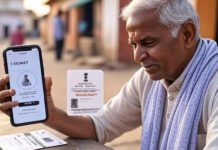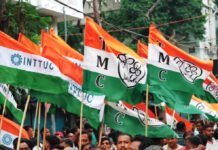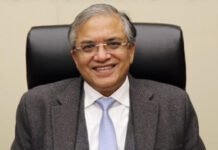The political landscape in India has heated up as the INDIA Alliance — a coalition of opposition parties — prepares for a massive protest march from Parliament House to the Election Commission of India (ECI) headquarters in Delhi. The march, scheduled for Monday at 11:30 AM, comes amid allegations of vote rigging and claims that the ECI, in collusion with the Bharatiya Janata Party (BJP), manipulated electoral processes to favor Prime Minister Narendra Modi’s third consecutive term.
No Official Permission Yet for the March
According to Delhi Police officials, no official request or permission has been sought by the INDIA Alliance for this march. The protest is expected to see around 300 Members of Parliament (MPs) from both the Lok Sabha and Rajya Sabha walking from Makar Dwar in Parliament House, passing Transport Bhawan, and heading towards the Election Commission headquarters.
The police have indicated that security arrangements are under review, but any unauthorized march will be subject to legal protocols under the Delhi Police Act and Section 144 restrictions if applicable.
Opposition’s Core Allegations
The INDIA Alliance has leveled serious accusations against the ECI, claiming that the Special Intensive Revision (SIR) of voter lists in Bihar has disenfranchised millions of legitimate voters.
The opposition alleges that over 6.5 million voters’ names have been removed during the SIR process.
They claim that the revisions disproportionately affect minority communities, marginalized groups, and opposition strongholds.
The coalition asserts that this is part of a broader scheme to undermine democratic rights and sway future electoral outcomes in favor of the ruling party.
Rahul Gandhi, Leader of the Opposition and senior Congress MP, has taken a leading role in the campaign. In a press conference at the Congress headquarters, Gandhi presented what he described as evidence of electoral manipulation, using data from Mahadevpur Assembly Constituency in Karnataka.
Rahul Gandhi’s Press Conference: Key Claims
During the media briefing, Rahul Gandhi accused the ECI of refusing to share essential voter data, asserting:
“The Election Commission is not giving us data in Mahadevpur. If we investigate other Lok Sabha constituencies, the truth about the state of our democracy will be exposed.”
He alleged that the Prime Minister’s third term was secured through a tactical partnership between the BJP and the Election Commission, compromising the integrity of the electoral process.
Gandhi also called for continuous discussion in Parliament over the SIR issue and demanded immediate withdrawal of the campaign in Bihar.
Election Commission’s Firm Rebuttal
The Election Commission swiftly countered these allegations, labeling them as baseless and misleading. Sources within the ECI stated that if Rahul Gandhi truly stands by his claims, he should sign an affidavit affirming his accusations or apologize to the nation for spreading misinformation.
In its official counter affidavit filed in the Supreme Court, the ECI declared:
No eligible voter’s name will be removed from the electoral rolls.
Any removal from the August 1, 2025 draft voter list will strictly follow legal procedures.
Before deletion, voters will receive formal notice stating the reasons and will be given an opportunity to present evidence to retain their names.
The Commission emphasized that the SIR process is intended to update and clean voter lists, not disenfranchise citizens.
Supreme Court’s Involvement in the Bihar SIR Dispute
The controversy took a legal turn when a petition was filed in the Supreme Court accusing the ECI of illegally removing voters during the SIR campaign in Bihar. The petitioners claimed that the large-scale deletions were politically motivated and violated the principles of universal adult suffrage.
On review, the Supreme Court sought a detailed explanation from the ECI. In its reply, the Commission reiterated that all voter roll changes would adhere to Section 22 and Section 23 of the Representation of the People Act, 1950, ensuring due process.
Political Fallout and Nationwide Reactions
The INDIA Alliance’s march has triggered sharp political polarization:
BJP leaders have dismissed the protest as a publicity stunt, accusing the opposition of fabricating conspiracy theories to cover up electoral defeats.
Opposition parties, including Congress, Trinamool Congress, DMK, RJD, and AAP, have pledged united resistance against what they call the “systematic hijacking of democracy.”
Civil society groups and election watchdogs have urged the ECI to maintain transparency in the SIR process to restore public trust.
Security and Logistical Preparations
Given the high-profile nature of the march, Delhi Police are preparing for tight security measures, including:
Deployment of Rapid Action Force (RAF) units in sensitive areas.
Installation of CCTV surveillance along the route.
Possible barricading near Transport Bhawan and Ashoka Road to control crowd movement.
Sources suggest that traffic disruptions are expected in central Delhi, with commuters advised to take alternate routes.
Historical Context: Protests to the ECI
Marches to the Election Commission are not unprecedented in Indian politics. The ECI, as the constitutional guardian of elections, has often been at the center of political controversies, especially in the run-up to elections.
However, the scale of the INDIA Alliance’s current mobilization — involving 300 MPs and coordinated action from multiple parties — makes this one of the largest opposition protests targeting the ECI in recent years.
Next Steps and Potential Legal Implications
If the INDIA Alliance proceeds without police permission, the march could invite legal consequences, including charges under unlawful assembly laws. However, political analysts suggest that the opposition might be prepared to face arrests to draw national and international attention to their cause.
The Supreme Court’s upcoming hearings on the Bihar SIR petition will also be crucial in determining whether the opposition’s allegations hold legal weight. A verdict in their favor could invalidate portions of the SIR process, while a ruling upholding the ECI’s stance would bolster the Commission’s credibility.
Conclusion
The clash between the INDIA Alliance and the Election Commission represents more than just a procedural dispute — it is a test of India’s electoral integrity and democratic resilience. As the protest march looms, the nation watches closely to see whether the confrontation will lead to greater transparency or deepen the crisis of trust between political stakeholders and the institutions meant to safeguard free and fair elections.
















